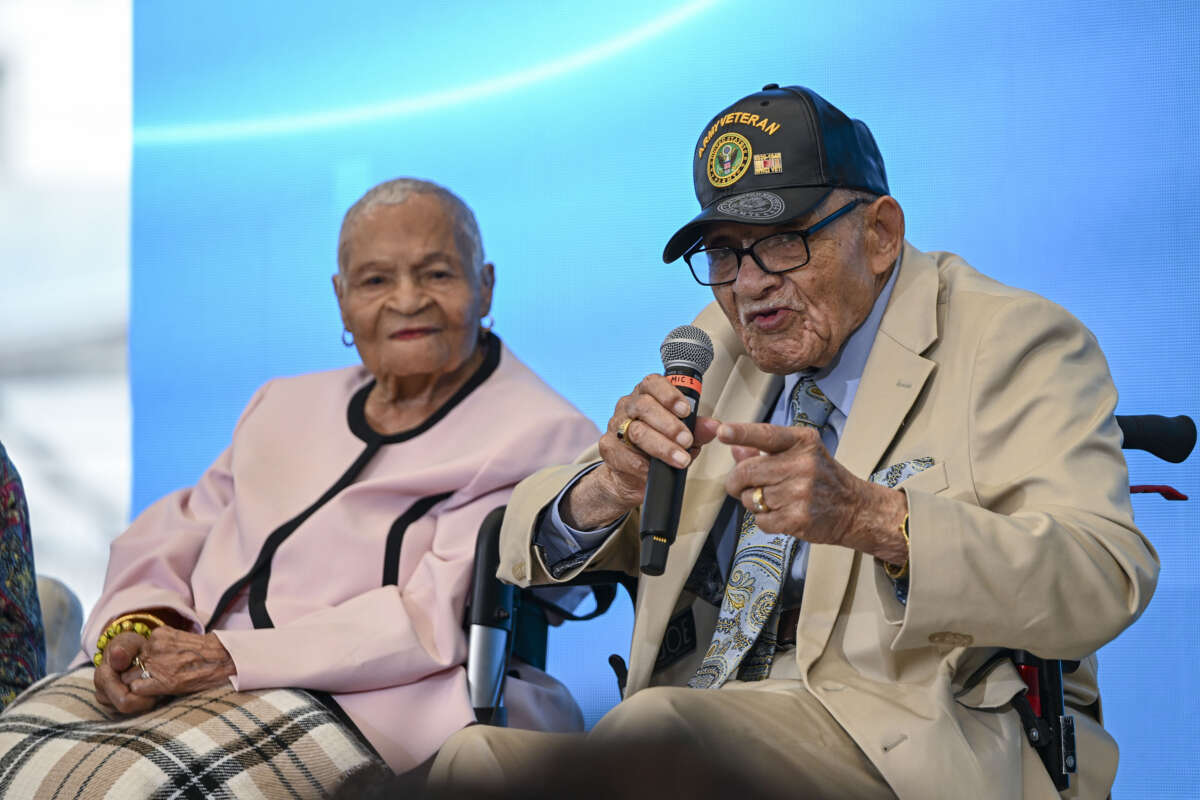On Wednesday, the Oklahoma State Supreme Court dismissed a lawsuit brought forward by the last remaining survivors of the 1921 Tulsa Race Massacre, who were seeking financial reparations from the city for what is largely regarded as one of the worst incidents of racial violence in American history.
On May 31 and June 1 of 1921, a mob of as many as 5,000 armed whites, including some who had been deputized by city authorities, descended upon a Tulsa neighborhood known as Greenwood, which had earned the moniker “Black Wall Street” because its Black community was thriving economically. Aided by the Oklahoma National Guard, the rioters arrested, beat and robbed thousands of Black residents, systematically burning down more than 1,200 homes, as well as churches, schools, businesses, a hospital and a library.
The looters and arsonists killed up to 300 Black people in Greenwood, some of whom were buried in mass graves, and left over 9,000 Black Tulsans homeless.
The massacre was largely driven by white resentment over Greenwood’s racial prosperity, and started when an armed white mob tried to lynch a Black man who was falsely accused of raping a white woman in an elevator.
Only two known survivors are alive to this day — Lessie Benningfield Randle and Viola Fletcher, both over 100 years old, were children at the time of the attack. They are haunted by memories of the white supremacist massacre, with Fletcher saying in a CNN interview that she can still remember seeing “people getting killed” and properties “getting destroyed with fire.”
A third individual who was part of the lawsuit, Hughes Van Ellis, died last year, before the state Supreme Court could rule on the issue.
The plaintiffs asserted that they were entitled to compensatory damages under the terms of the city’s nuisance statute. They also noted that the city of Tulsa was continuing to receive “unjust enrichment” from the massacre by promoting it as a tourist attraction without returning financial benefits to the community.
A state district court dismissed the lawsuit last year. On Wednesday, the state Supreme Court upheld that decision, stating that the plaintiffs’ case does “not sufficiently support a claim for unjust enrichment” by the city.
The court recognized that Oklahoma state law stipulates that the nuisance law is violated “when the offending party unlawfully does an act, or omits to perform a duty…[that] annoys, injures or endangers the comfort, repose, health, or safety of others” or “offends decency,” among other actions. But the court still ruled against the plaintiffs’ claims, stating that any lasting economic and social impacts from the massacre in 1921 “do not fall within the scope of our state’s public nuisance statute.”
The court acknowledged that the “grievance with the social and economic inequities created by the Tulsa Race Massacre is legitimate and worthy of merit.” But it went on to rule that:
The law does not permit us to extend the scope of our public nuisance doctrine beyond what the Legislature has authorized to afford Plaintiffs the justice they are seeking.
“The continuing blight alleged within the Greenwood community born out of the Massacre implicates generational-societal inequities that can only be resolved by policymakers — not the courts,” the state Supreme Court added.
Critics condemned the decision by the Oklahoma Supreme Court.
“This is infuriating,” wrote Salima Koroma, director of the documentary “Dreamland: The Burning of Black Wall Street.”
“It’s a blatant slap in the face to the Black Americans — and their descendants — who lost everything in the Tulsa Massacre,” Koroma added.
“This is a dark day for the reparations conversation,” former journalist turned publicist Tianna Mañón said. “If we can’t get reparations for the Tulsa massacre, one of the most profound and well-known incidents, it sets a horrible precedent for other historical moments going forward.”
Lessie Benningfield Randle appeared to have predicted the outcome of the court case during an interview in November.
“I would like to see justice. It’s past time,” she told The New York Times. “I would like to see this all cleared up and we go down the right road. But I do not know if I will ever see that.”
A critical message, before you scroll away
You may not know that Truthout’s journalism is funded overwhelmingly by individual supporters. Readers just like you ensure that unique stories like the one above make it to print – all from an uncompromised, independent perspective.
At this very moment, we’re conducting a fundraiser with a goal to raise $32,000 in the next 3 days. So, if you’ve found value in what you read today, please consider a tax-deductible donation in any size to ensure this work continues. We thank you kindly for your support.
